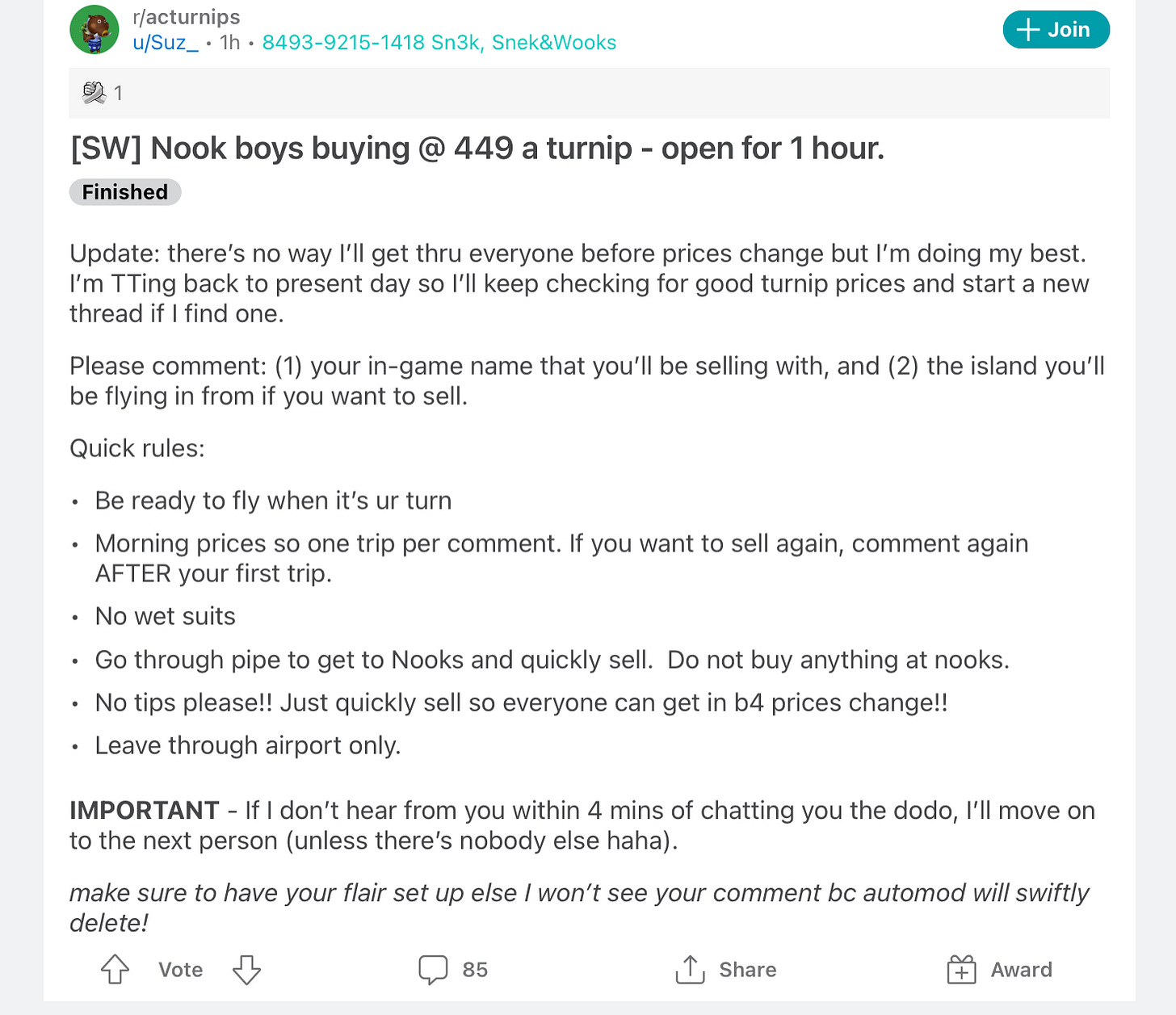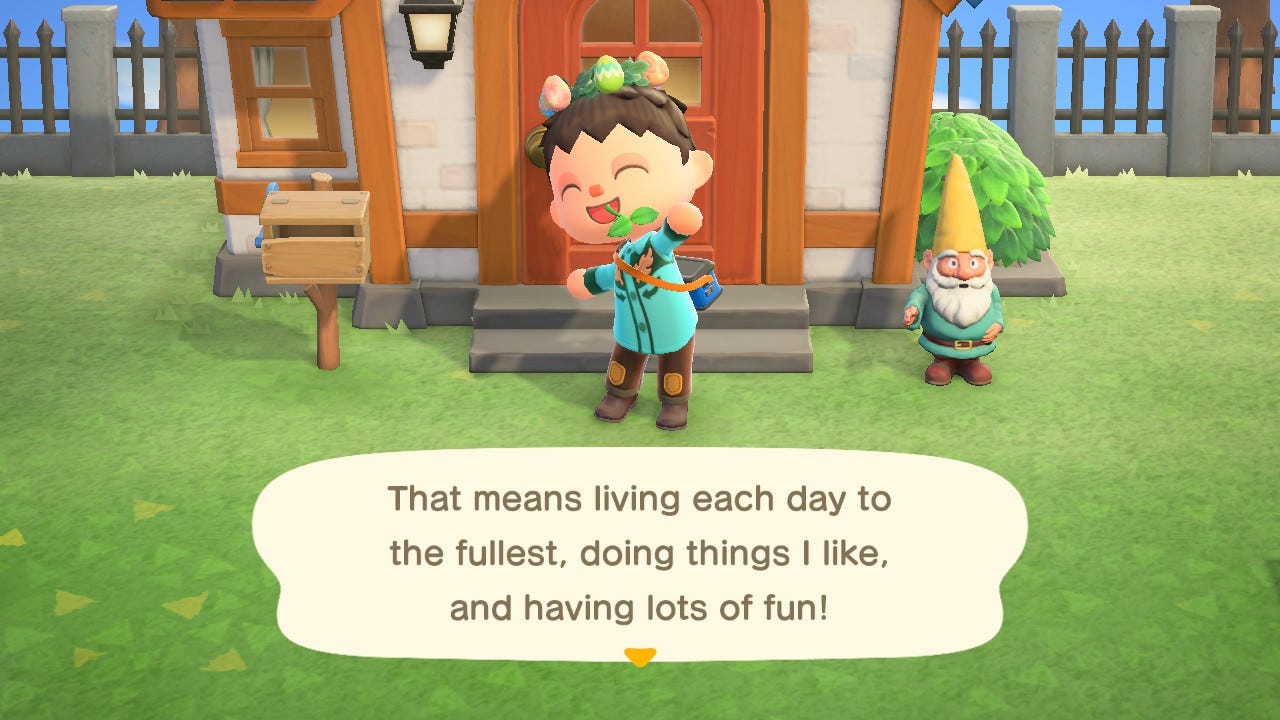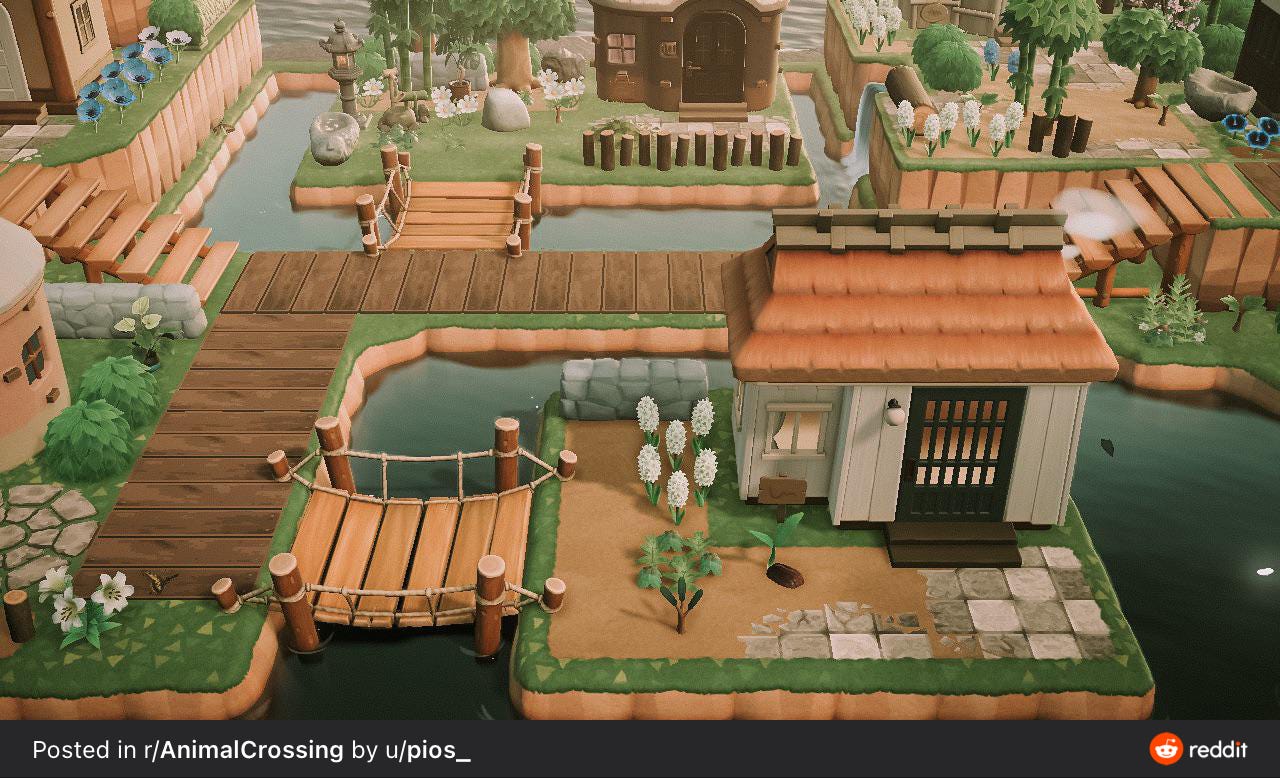Influencer Culture Touches Everything, huh? (Part 2)
This week I talk about how weird influence-chasing in Animal Crossing seemed to cheapen the experience for its newest fans
This is Part Two of a two part essay. The first part can be read here.
III - Influencer content in Animal Crossing
This whole “keeping up with the Joneses” ethos also hung a cloud over the Animal Crossing game that was released last year as well. While video gaming as a medium is no strangers to influencer content thanks to rise of Twitch, it was interesting to see how social media influencing impacted a specific game like Animal Crossing, in a way that often felt negative.
Animal Crossing as a property had a well-deserved moment in 2020, but I’ve been a fan since the original US release of the franchise on the GameCube when Nintendo had no earthly idea how to market it:
Animal Crossing has such oppressive charm that it convinced a bunch of image-conscious middle-school boys to play a game about house decorating and living in a cutesy animal village at an age when we were simultaneously calling everything vaguely uncool or unmasculine “gay”. Me and my neighborhood goons would have ad-hoc sleep overs whenever there was an in-game rainstorm so we could stay up all night catching high-value Red Snapper, Barred Knifejaw and Fossil Fish that we would sell in-game the next morning for a massive profit. Looking back on this phenomenon as an adult, I always knew there was a mass-appeal charm to Animal Crossing that could make it bigger than Mario. That proved correct in 2020 thanks to the popularity of the Switch and the happenstance timing of New Horizon’s release at the beginning of COVID-19.
A brief primer for those somehow unfamiliar: Animal Crossing: New Horizons is a low-stakes sandbox game designed to feel like an island getaway with no ability to lose and no specific goals in mind. You do summer-camp esque outdoorsy tasks like fishing and bug catching, engage in light hearted dialogue with cutely-designed animal neighbors, and slowly develop a barren island with a tent into a wholly developed and decorated island getaway with a mansion. There is also a light social element to the game, where you also have the ability to visit friends islands and write them letters. By its very design, Animal Crossing is supposed to be a very laid back, low-stakes experience.
This is not at all how the game was played if you followed the game online in any capacity, in which “influencing” somehow took a game devoid of competitive elements and made it a competition.
The first theater of this competition involved folks attempting to break the games economy for the purpose of “rushing” to unlock everything. Early on though, there was a real anxiety in the community about other people being further along in unlocking bigger houses or island improvements, which was typically done by making money to progress aspects of the game
The fastest way to acquire currency is by playing the “stalk market” by buying turnips once a week, which you can either sell low or high depending upon fluctuating prices throughout the week before they spoil. Everyone’s island had a different “turnip” economy, so it encouraged you keeping in touch with your friends to let them know to visit whenever you had a high turnip price so your friends could flip and turn a tiny profit.

Given the pressure to keep up with the online conversation, cheating this “stalk market” was the surest way to quickly earn money and “catch up” with people further along then you, even if it meant cheating yourself out of the experience of properly playing the game.
A weird economy of third-party websites cropped up to support this community initiative to almost skip playing the actual game. Subreddits and websites appeared that would allow you to search online for islands across the world to unload your stalks, and literally wait in queues of up to 30 people—potentially hours of real-life waiting—to have the opportunity to go to high-price islands to unload your stalk supply.

This fear of “running behind social media” took a cute “ya win some, ya lose some” minigame and reduced it to as nourishing an experience of waiting in a Soviet breadline. After waiting for an hour or so for your number to be called, you’d haul an inventory full of turnips to some strangers island to sell for a game-breaking profit, and then pay a tribute to the local Generalissimo by leaving bags of money in front of their house as a tip like they were the middleman in your Cocaine Empire. If Nintendo was still chasing the MTV generation, I can almost hear in my head of what it would sound like if they unloaded some racks for Rick Ross to pen a song about it.
The downside of this is the obvious fact that exploiting the game like this cheats you out of having to engage with so many of the relaxing parts of playing the game like catching fish and insects, growing fruit, and building furniture. Speedrunning yourself into wealth in such blatantly unfun and bearucratic fashion feels so antithetical to a game that again, is about spending a relaxing, care free time on an island.
Once most players were Post-Scarcity due to the tactics above, the next theatre of war was to make islands as intricately designed as possible for social media plaudits.
As previously stated, the original Animal Crossing gave each player character their own house to upgrade and decorate as you please. This was always my favorite aspect of the game, because of the limited size and toolset, you could decorate a house in a personalized and relaxing way. For someone with no appreciable real-world aesthetic taste, aimlessly shifting furniture around in rooms like the one from my save below, to the tune of some excellent in-game “singles”, feels like the digital equivalent of tending to a Bonsai Tree that always puts me in a tranquil mood.
However, Animal Crossing: New Horizon allowed you to do perform this level of customization on your entire island, which made the possibility space of what you could “tend” unbearably massive, and gave you tools for doing so that were cumbersome and borderline unfun to engage with. Regardless, it didn’t stop people from creating some incredibly impressive and daunting designs like the examples below:
As impressive as this content is, knowing what I know about this game, I could see some of these things taking upwards of tens of hours to complete. If you extrapolate that over the course of populating an entire island in that level of detail, it could translate to hundreds of hours of work, which again, is an unhealthy amount of time for anyone to sink into what is supposed to be a low-key, relaxing game.
But since this is the content that gets passed around as “average” creations done in the game on social media, sure enough in the comments section of many such posts, you find impressed but wistful comments from Unwashed Normie Casuals about how cool these posts look, but how far behind they feel in being able to come up with such creations on their own:
Sometimes in the hunt for retweets and upvotes, a mere screenshot of a content-creators impressive display wasn’t enough. One miniature scandal I remember was the fact certain users started low-key post-processing their screenshots, to the point now where you can pay real money to access an economy of post-processing filters with Animal Crossing-designed settings in mind.
It’s so bizzare to see “no filter” disclaimers on video game screenshots like the early days of Instagram—a line of demarcation in some inter-community battle regarding Authenticity™ in Animal Crossing screenshots. Remember: this is a video game about living a worry-free life on an island, surrounded by quirky animal friends.
I think the combination of the two phenomenon above transformed a very “at your own pace” game into a competitive one for anyone who was passively involved in it’s online community, such that newer fans felt like they were playing it incorrectly by not dedicating the same effort as the hardcores. While I always anecdotally noticed this sentiment in the comments section of many popular posts, you can actually weirdly find actual reporting on this phenomenon of people burning themselves out on the most stress-free game possible due to social media:
“My ideas that I tried never felt cute, especially compared to images I’d see on Twitter, and it made the game very stressful to play, and see people talking about constantly online,” she told Polygon.
Again: this bums me out! As such a long time fan of Animal Crossing, it’s really disheartening to see people coming to this franchise the first time and having the wrong takeaways about it based on the strange incentives of the social media that surrounds it.
IV. Conclusion
As a parent, you are constantly looking for ways to kill time in 15 minute chunks to prevent your kids from coming up with more destructive distractions of their own. One of my constant go-to’s is open up a coloring book and a box of crayons.
Often times my daughter, likely parroting her experience of her day care provider to her, asks me to do the coloring for her and I oblige. Since having kids, I probably haven’t “colored” regularly in like 20 years, because why would I? But there is something pretty relaxing about it. Thanks to the limited pallete of colors in a box of crayons and the obvious guideance provided by a coloring book, the simple act of filling a page with color does feel somewhat meditative. Sometimes, I’ll even extend my little talents and I try to draw these terrible renditions of our daughter or my dog or a cartoon she likes and she can actually recognize them despite being such terrible facimililes, and it’s truly relaxing because it’s so no-stakes and the only audience is her.
While I don’t consider coloring a hobby, it feels decompressing in the way that I feel any hobby should. I am fully engaged on other aspects of my life in terms of my job, being married, and having kids, and my ego is satisfied by the nourishment I get in performing those roles mostly well. I go to hobbies to turn my brain off from my larger responsibilities, but still engage it in other stimulating ways that don’t require validation.
It feels to me, that the sort of influencer and sharing economy content that touches everything is dominated by people who seem to get satisfy their egos and derive their self worth on being perceived the best at a given hobby. The biggest board game collection. The most beautiful Animal Crossing island. Social media obviously optimizes to showing you “The Best” of anything created in any field, which makes anything merely adequate seem obsolete.
But hobbies should be the celebration of the adequate! Hobbies should be the things we retreat to melt away the stress from all of the high-performance activities we do in our professional or families lives, not as another avenue to harness that high-performance energy in and “compete” on.
I think the examples I discuss are ultimately pretty anodyne, because board gaming and Animal Crossing are not hobbies that result in creative output. But I wonder: how hard it would be to get into a hobby where there is? If I wanted to get into something like baking, or sketching, or woodworking, how immediately discouraged would I be comparing myself against people that have staked their entire identity against it? It a quite a paradox where an online community may be the easiest avenue to figure out where to start in a hobby, but that that same community might also massively discourage you from getting into it in the first place.
Maybe there is no massive wisdom to be garnered here, but for me personally, it’s another arrow in my quiver as to why social media ultimately feels like an empty calorie vice that takes away more than it adds from people’s lives. The less I engage with the things I like online, the more rich I find my enjoyment of them in the real world.









